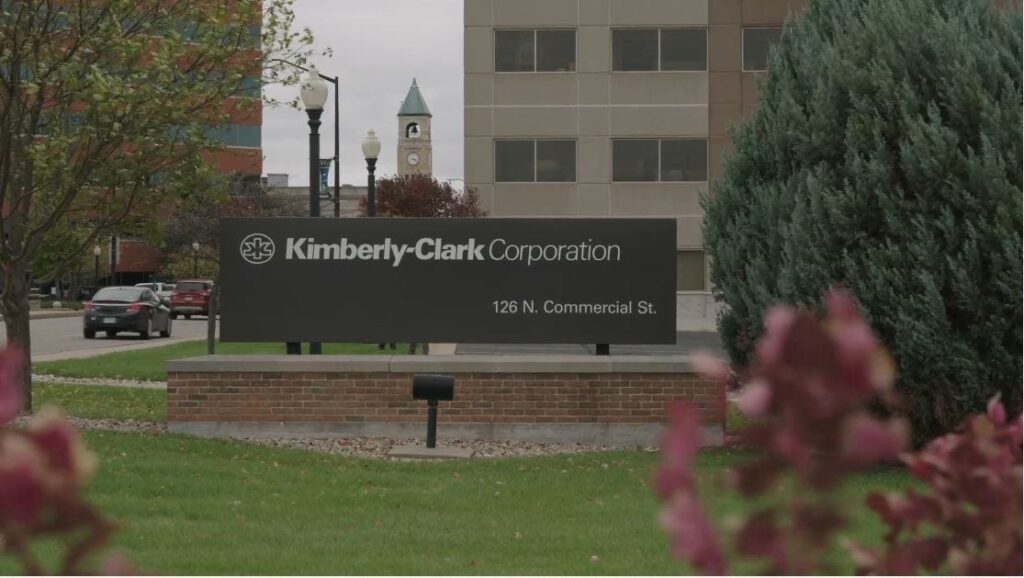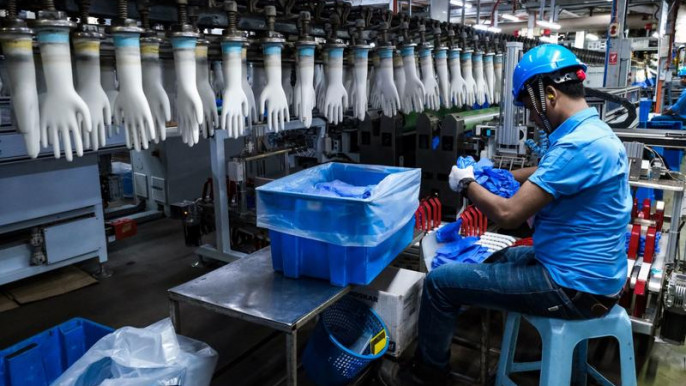26th Sept 2024: Former Malaysian gloves plant workers sue Kimberly-Clark. They allege abuse at the company’s supplier Brightway
Former employees of a Malaysian latex gloves supplier for Kimberly-Clark Corp. say they were trafficked, abused, and provided unsanitary company housing with barely edible food.
Original Source: Milwaukee Journal Sentinel by Rick Barrett – 26th September 2024
Several of them interviewed by the Milwaukee Journal Sentinel described their housing as a crowded, stifling hot dormitory infested with insects.
At one location, hundreds of workers were housed in what appeared to be shipping containers, according to a Malaysian government official, who in a media report described the squalor as a form of modern slavery.
The sparse meals at a company canteen were sometimes contaminated with cockroaches, several of the former employees, now among 13 plaintiffs in a lawsuit against Kimberly-Clark, told the Journal Sentinel.
The plaintiffs said they were only allowed food from the company canteen, even if it was barely edible, and were fined if they tried to cook anything for themselves.
“Sometimes I felt like vomiting,” one of them said. He was identified as Shuvo in court documents and agreed to speak with the Journal Sentinel on the condition that his full name not be used, out of fear of retaliation by an employer or trafficker.
Lawsuit alleges human trafficking and forced labor
The lawsuit filed in August 2022 in federal court in Washington, D.C., and amended earlier this year, alleges that Kimberly-Clark and Ansell Ltd., an Australian firm with a U.S. presence, profited from human trafficking and forced labor at their Malaysian gloves supplier, Brightway Group.
Kimberly-Clark, founded in Neenah in 1872, is a global company with personal hygiene products including Scott toilet paper, Huggies diapers, and Kotex menstrual-care pads. The company has more than 41,000 employees, and while it’s now based in Irving, Texas, still has offices in Neenah and manufacturing in the Fox Valley.
Kimberly-Clark declined to answer questions for this article, but in a statement to the Journal Sentinel said it believes the lawsuit is “entirely unfounded” and this summer asked that it be dismissed by the court, which has not yet ruled on the motion.
“Kimberly-Clark believes that all workers should be treated with respect and in accordance with our workplace and human rights standards,” the statement said. “We strive to foster a culture of integrity that supports our employees and those of our suppliers in living out these values.”
The plaintiffs are seeking compensation for abuses they claim to have endured from roughly 2017 through 2020 making gloves at the Brightway plant for Kimberly-Clark and Ansell. They brought their complaint to a U.S. court because, as Bangladeshi migrants in Malaysia, they did not believe the Malaysian judicial system would address their allegations. They’re also seeking to represent others in the case.
“They worked under horrible, dangerous conditions,” said their attorney, Terry Collingsworth with International Rights Advocates in Washington, D.C.
Workers paid high fees to obtain their jobs, putting them in debt
Shuvo said security guards patrolled the factory dormitory where he and other Bangladesh workers stayed to keep them from leaving for more than around two hours at a time, and only with written permission. Management, he said, seized their passports so they couldn’t easily return home to Bangladesh.
The former employees said they paid labor recruiters in Bangladesh thousands of dollars each to obtain jobs at the Malaysian factory.
Shuvo said he went into debt to pay $4,086 in fees. As his family’s sole breadwinner, he needed the job to support his parents and two younger sisters.
“I went to Malaysia with big hopes,” he said.
Shuvo said he learned about the factory from a colleague in Bangladesh who said that he would work in an air-conditioned office with good food provided by the company.
However once he arrived at the plant, Shuvo said, he was forced to work 12-hour or longer days with restricted access to food, water and restrooms.
He claimed that he was slapped, beaten, verbally abused and threatened with death. He said that his pay was delayed and reduced for any small mistakes he made, even if they weren’t his fault.
The former employees allege they were often forced to work seven days per week under hazardous conditions.
Worker alleges he suffered severe leg injuries
Plaintiff Nurul Amin claims that he suffered a severe injury when his leg was caught in a chain. “When the injury occurred, Nurul waited for his manager for two hours but his manager never came. He was forced to find treatment on his own and pay for it himself,” the lawsuit alleges.
“Three days before an audit occurred at the facility, Nurul and his fellow workers were forced to practice saying all good things about the company. However, when the auditors arrived, Nurul was not allowed to interact with them,” according to the lawsuit.
The 32-year-old previously worked for a medical company but the pay was too low to support his famly, all of whom are financially dependent on him.
“When Nurul’s uncle raved about Brightway to him and introduced him to an agent from Amin Tours and Travels, Nurul found it difficult to refuse the offer. Nurul paid Amin Tours and Travel $3,441 in full before moving to Malaysia,” the lawsuit says.
Plaintiff Mohammed Imamul claims he was frequently punished by his supervisors. He was slapped and kicked if any gloves were not taken from the production line at the correct time, according to the lawsuit.
70 workers allegedly lived together in pest-infested housing
For his living quarters, Imamul shared a room with 70 other workers. The room was near the jungle and the workers often found snakes, frogs and insects in their sleeping quarters, the lawsuit claims.
Plaintiff Mohammad Kamruzzaman claims he inhaled chemicals on the job which resulted in blood dysentery. He was treated as a slave with very limited access to food, water, restrooms and his rightful pay, the lawsuit alleges.
Plaintiff Jaker Hossen claims he inhaled a large amount of gas at work, which resulted in significant harm to his stomach. He had to pay for his own hospital treatment, according to the lawsuit.
When workers went on strike to protest the high recruitment fees they paid to join Brightway, the company hired local gangs to control and beat them, the lawsuit claims. Brightway allegedly confined several of the workers in one room for three days without food before sending them back to Bangladesh.
The plaintiffs continuously had fees deducted from their pay “for all kinds of absurd reasons,” according to the lawsuit.
“This pattern created a system of debt bondage which made it financially implausible for them to escape Brightway and return home to Bangladesh. Plaintiffs also lived and worked under the constant threat of physical and mental abuse from their supervisors and the guards surrounding the compound,” the lawsuit alleges.
Kimberly-Clark says it wasn’t responsible for the actions of a supplier
In court documents, Kimberly-Clark and Ansell underscore the fact they did not manage the Brightway factories that produced gloves for them and say they did not have any role in the alleged trafficking and workforce abuses.
“The alleged conduct at the center of this case was carried out by third parties or one of Brightway’s subsidiaries (BioPro),” the defendants say.
“Kimberly-Clark Professional stopped working with Brightway in 2021,” the company said in its statement to the Journal Sentinel.
The defendants say the law does not permit a civil cause of action under the U.S. Trafficking Victims Protection Reauthorization Act simply because they were customers of Brightway.
In May 2021, the news agency Reuters reported that labor audits of Brightway detailed 61 violations of global ethical standards and 50 violations of Malaysian labor laws, although the auditors concluded they did not find proof of forced labor. The company’s managing director, G. Baskaran, shared audit reports with Reuters and said they showed the company did not practice any form of forced labor or modern slavery.
However, the former employees interviewed by the Journal Sentinel said third-party audits of the plant they worked at weren’t enough to identify the abuses and poor living conditions. They said management knew in advance when auditors were coming, giving the company time to make everything look good for an inspection.
In their defense to the lawsuit, Kimberly-Clark and Ansell also cited a recent U.S. court decision which dismissed claims by former cobalt miners and their representatives against technology companies accused of violating the Trafficking Victims Protection Reauthorization Act, also known as the TVPRA.
The plaintiffs in that case were former miners, legal representatives of children who were formerly miners, and representatives of child miners killed in mining operations in the Democratic Republic of the Congo.
They sued Apple, Alphabet, Dell Technologies, Microsoft and Tesla, alleging the companies violated the TVPRA by participating in the global cobalt supply chain. The plaintiffs claimed the tech companies purchased cobalt from large international suppliers to manufacture rechargeable lithium-ion batteries, and the subsidiaries of the suppliers obtained cobalt through forced labor.
The case was dismissed in March. Among other things, the court held that the plaintiffs did not adequately allege the tech companies “participated in a venture” with the cobalt suppliers and instead had only a buyer-seller relationship, according to an article written by Sarah Friedman of the Law Library of Congress.
U.S. Customs has banned some gloves from Malaysia
The use of forced labor in supply chains has led the United States to adopt measures aimed at identifying and addressing the goods allegedly produced by it.
For example, between September 2019 and January 2022, U.S. Customs and Border Protection issued eight Withhold Release Orders banning certain Malaysian products from being imported into the United States.
A December 2021 order against Brightway was still active as of August 14, according to the U.S. Customs website. The order was based on information that reasonably indicated the use of forced labor in the company’s manufacturing operations, officials said at the time.
Customs and Border Protection will not allow goods tainted with forced labor to make their way into American households and businesses, Chris Magnus, CBP Comissioner said in a December 20, 2021 news release announcing the Brightway Withold Release Order.
Lawsuit says Kimberly-Clark, Ansell received reports about workers
Businesses should never benefit from the misery of workers, said Andy Hall, a migrant workers rights specialist who has assisted Bangladesh workers in their complaints against Malaysian manufacturers including Brightway.
The Kimberly-Clark lawsuit claims that Hall sent numerous and detailed reports to Kimberly-Clark and Ansell senior managers reporting systematic trafficking and forced labor in their supply chains, particularly at Brightway.
“He also regularly informed them that their so-called audits performed by outside auditors at the Brightway facilities were not accurate due to prior notice and superficial changes made by Brightway for the purpose of misleading the auditors,” the lawsuit alleges.
In court documents, Kimberly-Clark and Ansell cast doubt upon Hall’s claims, saying the lawsuit doesn’t contain specifics offered about the alleged communications and when the companies supposedly received them.
Hall said he’s investigated trafficking and forced labor in multiple industries including electronics manufacturing.
“The conditions for migrant workers from the Philippines, Indonesia, Vietnam, Thailand and Taiwan are some of the most challenging I have ever seen,” he said. “The levels of debt incurred by these vulnerable, often lower skilled migrant workers as a result of uncontrolled and unethical recruitment and exploitative employment, by employers and local agents who manage them, is in urgent need of attention.”
Malaysia is about a four-hour flight from Bangladesh. It’s been a destination for Bangladesh migrants seeking jobs to lift them out of poverty.
Malaysia hires migrant workers in manufacturing and the palm oil industry. The Malaysian government does not fully meet minimum standards for the elimination of human trafficking but is making significant efforts to do so, the U.S. Embassy in Malaysia said in a 2024 report.
“Official complicity and corruption have undermined anti-trafficking efforts and allowed traffickers to operate with impunity; this also increased migrant workers’ vulnerability to trafficking. Delays in prosecution, insufficient interagency coordination, and inadequate services for victims discouraged foreign victims from remaining in Malaysia to participate in criminal proceedings,” the Embassy said.
Former employees say they want their story told
One of the lawsuit plaintiffs said he fled the gloves factory before he could be fired and sent back to Bangladesh without any employment opportunities. He had gone to Malaysia because he needed work to support his family and pay for his mother’s cancer treatments.
Another plaintiff said he was forced to remain in Malaysia because he did not have the means or ability to return to Bangladesh. And another told the Journal Sentinel he was now working at a hotel in Saudi Arabia after having suffered burns while working at the gloves plant.
Shortly before the lawsuit was filed, the plaintiffs were reimbursed their recruitment fees by Brightway as part of a program to address the issues in the U.S. Customs and Border Protection findings, according to court documents.
But it does not change the fact that the recruitment fees were part of a system of debt bondage the plaintiffs endured from the start of their employment, nor does it change the other unjustified deductions for food, lodging and penalties, the lawsuit says.
Shuvo is now employed in the construction industry in Saudi Arabia. He said that he would have feared for his safety if he had remained in Malaysia where he had been identified as a whistle blower against abuses of migrant workers.
While reporting violations at Brightway, Shuvo told Hall of the direness of his situation at the company, according to the lawsuit. Hall said he engaged in discussions with two Kimberly-Clark executives regarding an evacuation plan for Shuvo to flee Malaysia.
The two executives tentatively accepted responsibility for Shuvo’s safety and agreed to cover the costs of relocating him and severance pay, the lawsuit says.
However, at the last minute, Kimberly-Clark backed out of the agreement, according to the lawsuit.
An auditing firm used by Kimberly-Clark stepped in to provide for Shuvo’s travel costs. However, by then he had been revealed as a whistleblower and was targeted by Brightway, the lawsuit says. He was forced to escape to Bangladesh before an evacuation plan could be completed.
Shuvo said he would like Americans to know that disposable gloves for the U.S. market were, in his personal experience, manufactured under inhumane conditions.
“People were falling sick while producing gloves to make others safe,” he said.
Background Reading
10th August 2022 Reuters: Ex-workers at Malaysian supplier sue Kimberly-Clark, Ansell over alleged labour abuse
10th August 2022: Ansell and Kimberly-Clark Sued in US Federal Court by Trafficking and Forced Labor Victims from Malaysian Glove Company
28th Dec 2021 Reuters: Ansell halts orders from Malaysian glove maker Brightway after US ban
20th Dec 2021 Reuters: U.S. Customs bans fifth Malaysian glove maker Brightway over alleged forced labour
20th May 2021 Reuters Insight: ‘Slavery’ found at a Malaysian glove factory. Why didn’t the auditor see it?
28th Dec 2020 Malay Mail: Human Resources Ministry – Brightway Holdings, two subsidiaries to face 30 charges over workers accommodation
21st Dec 2020: Malaysia: Hundreds of migrant workers subject to “squalid” onsite living conditions at glove manufacturers owned by Brightway Holdings; Incl. buyer responses


